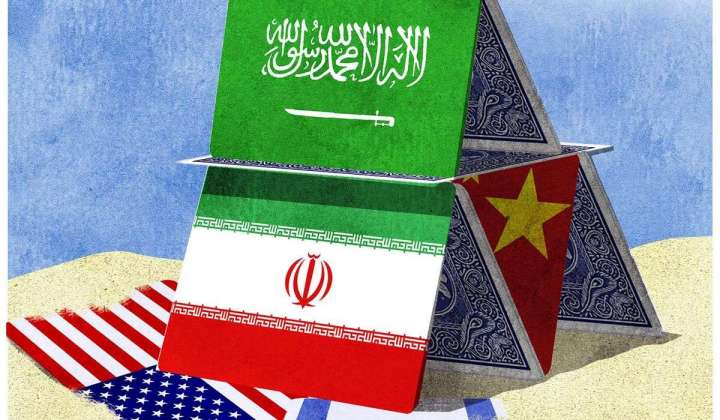China’s Saudi-Iran gambit

OPINION:
In one critical stroke, China has established itself as a major player in the Middle East, derailed a strategic objective of Israeli Prime Minister Benjamin Netanyahu and – again – caught President Biden flat-footed.
The March 10 announcement that Saudi Arabia and Iran had agreed to recommence diplomatic relations (severed in 2016) came after a four-day summit meeting in Beijing. Details of the agreement brokered by the Chinese remain sketchy but it probably includes an Iranian agreement to rein in the Houthi forces in Yemen that have attacked Saudi cities and oil facilities.
The agreement is both unusual and important because it bridges the religious Sunni-Shiite schism in Islam which often leads to war. Saudi Arabia is facing a severe threat from the Iranian nuclear weapons program which the deal does nothing to change.
Iran remains the world’s biggest sponsor of terrorism. It does so through the Iranian Revolutionary Guard Corps, the arm of government that finances and propels terrorism. The IRGC also dominates Iran’s legitimate and “black market” economies. China is probably Iran’s biggest oil customer which means it is dealing with the IRGC.
The Saudi-Iranian deal brokered by China makes it impossible for Mr. Netanyahu to achieve the peace agreement with Saudi Arabia he said was a priority when returned to office in December. He vowed to reach such an agreement because he realizes that the Abraham Accords, which former President Donald Trump had engineered between Israel and several Arab nations, cannot succeed without such an agreement with Saudi Arabia. After the Chinese-brokered Iran deal with Iran, Saudi Arabia cannot make such an agreement because Iran is Israel’s most relentless enemy.
The Saudis, as usual, are playing both sides against each other. On March 9, seeking incentives for an Abraham Accords-like agreement with Israel, the Saudis asked Mr. Biden for both U.S. security guarantees (against Iran?) and help with their non-military nuclear program. The former is out of the question while they cozy up to Iran and China but we could do the latter.
National Security Counsel spokesman John Kirby claimed that the Saudi-Iranian deal is a positive thing. Mr. Kirby said of the Chinese Saudi-Iran deal, “We support any effort to de-escalate tensions in the region. We think that’s in our interests, and it’s something that we worked on through our own effective combination of deterrence and diplomacy.”
That’s comprehensively wrong. We didn’t “work on” the Beijing-crafted agreement and probably didn’t have a clue about it before it was announced. More importantly, the Saudi-Iran deal cannot possibly be in our interests because it both strengthens and legitimizes Iran, and distances us from Saudi Arabia.
China’s Saudi-Iran deal is a direct reflection of Mr. Biden’s weakness. The Saudis have never been more than a transactional ally of ours, and they are evidently seeking a stronger horse to ride. Worse still, the agreement was made in the context of Beijing’s threatening rhetoric against the United States in terms more heated than it has used in decades.
Mr. Biden has repeatedly said that we want competition with China rather than conflict. China’s foreign minister, Qin Gang, directly refuted that position on March 7.
He said, “The U.S. side supposedly wants to put ‘guardrails’ on Sino-U.S. relations and not to clash.” Mr. Qin continued saying, “In fact, it wants China not to respond in words or action when slandered or attacked. That is just impossible… If the U.S. side does not put on the brakes and continues down the wrong path, no amount of guardrails can stop the derailment and rollover into confrontation and conflict.”
Mr. Qin said that Taiwan was China’s “first red line” and repeated that Taiwan was part of China that could be taken by force if necessary.
China isn’t done interfering in the Middle East. It reportedly is planning a major summit later this year between Iranian officials and Gulf State Arab monarchs. Merely by hosting the summit, China is reducing America’s standing among the participants. Any product of the summit will surely further reduce our influence in the Middle East.
While this is going on, China is also seeking to increase its influence in South America. In a recent House Foreign Affairs Committee hearing, Rep. María Salazar (R-Fla) told the committee that Argentina, as well as nations such as Venezuela and Bolivia, were allowing China to gain a military foothold in South America. She is entirely correct.
China has been arming the Venezuelan navy with anti-ship missiles for nearly three years and reportedly allows Chinese naval vessels into its ports. Bolivia has also received Chinese weapons. There is a Chinese-run military station in Argentina reportedly for space (or anti-space?) operations.
China is trying to fill the political vacuum in South America left by Mr. Biden’s negligent hands-off policy toward South America.
If Mr. Biden were a strong leader, he would be answering China’s overheated rhetoric in calm, strong words. He would not have been surprised by the Saudi-Iranian deal brokered by China and would have taken steps to stop it. He should, personally, be taking steps to strengthen the Abraham Accords and our influence on Arab leaders.
But Mr. Biden is not a strong leader. China will continue to increase its Middle East influence without American opposition while Mr. Biden sleepwalks to war with China.
• Jed Babbin is a national security and foreign affairs columnist for The Washington Times and contributing editor for The American Spectator.






